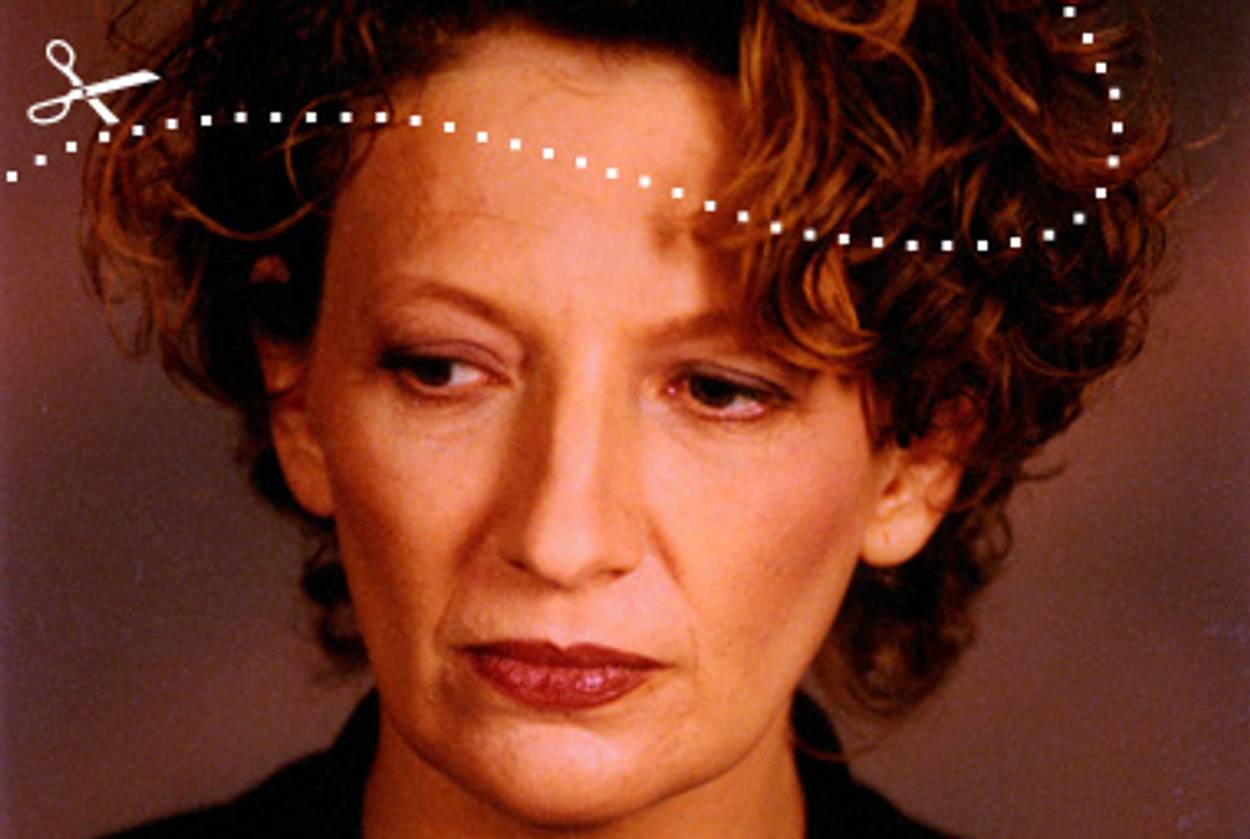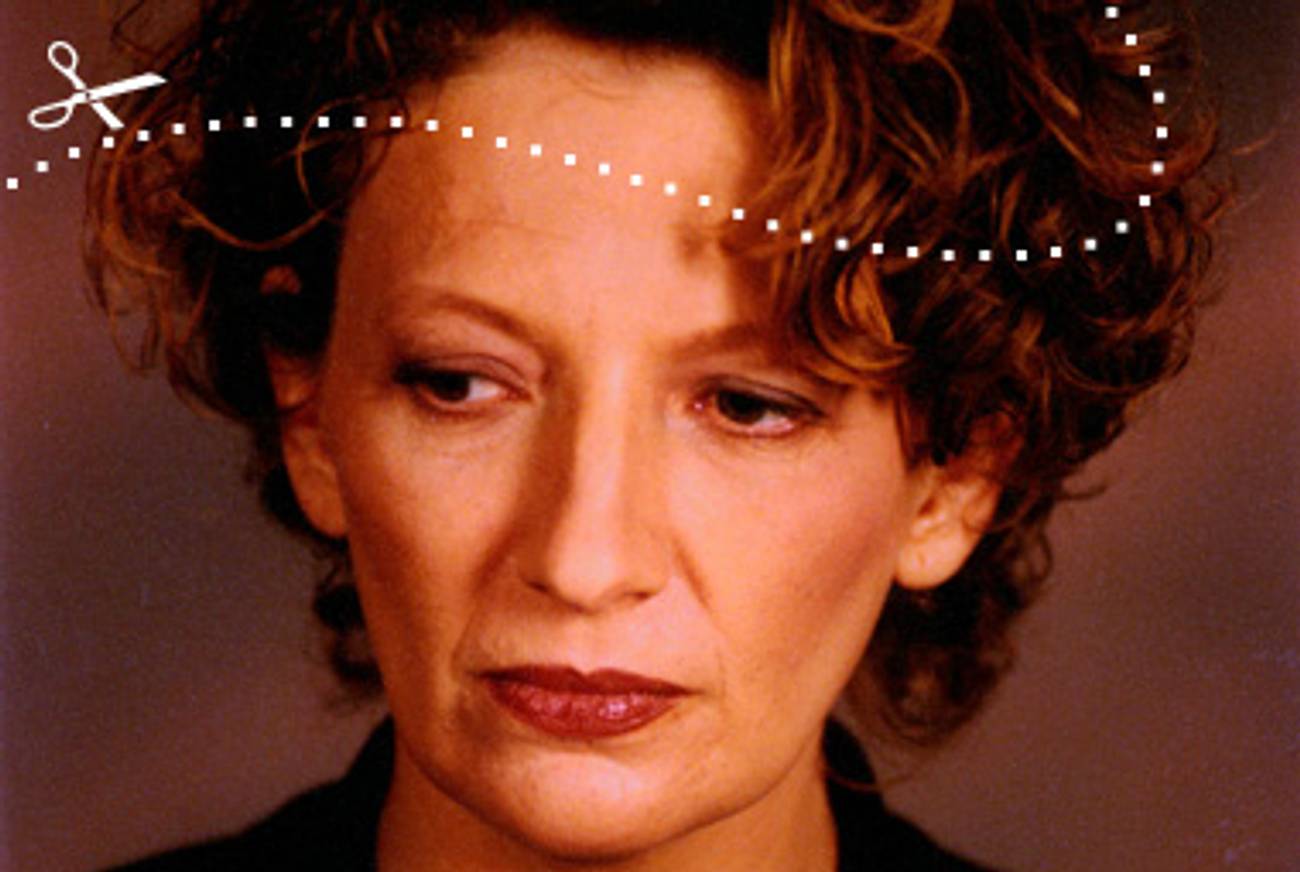A Cut Above
Orly Castel-Bloom’s Dolly City is the most important Israeli novel of the last four decades




Dolly City, the influential novel by Israeli author Orly Castel-Bloom—originally published in 1992 and released this month in a superb English translation by Dalya Bilu—begins with a cocker spaniel. The dog, aged and ill, is put to sleep, and its corpse is driven to the dunes outside town where it is stabbed and beheaded by a demented gravedigger. It is, by far, the book’s most tender moment.
What follows, largely unencumbered by the burdens of plot, is the story of Dolly, a psychotic doctor who finds an abandoned baby and then—driven by love, guilt, anxiety and all the other emotional foundations on which the mythical figure of the Jewish mother proudly stands—proceeds to torture him and others in hilarious and heartbreaking ways.
Such villainy, naturally, requires its own lair, which Dolly has in Dolly City, her apartment in an impossibly tall high-rise in the center of a barely recognizable Israel. A lick of language is enough to ascertain that by entering Dolly City, one has left behind all that is safe and familiar. Consider the following stretch, in which Dolly wonders what to name her newfound toddler: “I lay down on my giant bed and watched the TV shows picked up by the satellite dishes on the roof, smoking like a chimney as I did so. For a moment I caught myself whistling for the dog, and a string snapped in my body, C sharp, then I closed my eyes, and decided to call him Son, so that if anyone ever called him a son of a bitch, he’d take it personally and beat them up for the both of us.” In one breathless muttering, Castel-Bloom welds together the banal (those satellite dishes on the roof), the clichéd (smoking like a chimney), the deeply personal (the specific notation of the sentimental string that is snapped at the memory of the departed dog), the absurd (a son named Son), and the profane (Son being called a son of a bitch).
These are fine ingredients for literature, but Castel-Bloom’s aims are far above the merely aesthetic: Her Dolly City looks nothing like Israel, and yet it is probably the most emotionally honest portrait of the Jewish state produced in the past four decades. Just compare Dolly City to, say, Amos Oz’s Jerusalem: The eminence grise of Hebrew letters helped solidify his status with somber novels such as My Michael, in which the heroine, Hannah Gonen, fantasizes about being ravished by a pair of Arab twins with whom she played as a child. Oz’s landscape is all internal, psychic space, and his imaginary sex scene reads like softcore porn directed by Ingmar Bergman—tortured, overwrought, and ridiculous.
Castel-Bloom, on the other hand, has no need for grand psychological devices. On the subject of Arabs, as on any other subject, she gets straight to the point. “I discovered a new type of phobia in Dolly City—Arabophobia, fear of Arabs,” she writes. “I once read somewhere that you should tackle fear head-on. Fuck Arabs, if you’re afraid of them. You fuck them—and you see that the devil’s not as black as he’s painted, they’re just like everybody else.”
Such deceptively simple riffs do more than just shatter Israeli literature’s penchant for the metaphorical—all those family quibbles serving as the national drama writ small. It also takes a simple and courageous stand in support of normal life: If only you saw them without their clothes on, you’d understand that Arabs, just like anyone else, are ordinary people, not some symbolic stand-in for otherness and the complexity of life in a conflict zone.
This may sound like an obvious proclamation; in the ideologically charged vista that is Israel’s literary landscape, it is not. While in America narratives of romantic relationships between whites and Indians were common throughout the 18th and 19th centuries—the literary historian Werner Sollors called it the “red-white fusion”—Israeli literature had scrupulously avoided any mention of the possibility of real romance between Jews and Arabs. There could never be a Palestinian Pocahontas; whatever interactions the two peoples had were confined to fighting, fucking, or other forms of dominance. In one tart paragraph, Castel-Bloom presents a real alternative, filthy and sexy and inspired and eminently human. Life, she proposes daringly, could be just life again.
The same is true for nearly every word in this short and magical book. Even as the plot spirals from one horror to another—here’s Dolly using a rope and a rat to slowly drain the life out of an airline executive, and there she is with a scalpel and rampant bloodlust in some run-down German orphanage—the novel’s overall spirit is one of deep-seated humanism. In a society so heavily encumbered by the weight of war and remembrance, Castel-Bloom insists, the only decent form of exorcism is shamanic, absurdist, disturbing, but, ultimately, cleansing. Whether we read the book as a meditation on motherhood—and it is, I believe, one of the most inspired explorations of the topic ever written—as an excavation of the roots of the collective Israeli psyche, or as a bit of both, we’re bound to feel immensely relieved when setting free our gnawing fears and howling anxieties; seeing the beasts run wild makes them less scary.
In her particular style—melding the concrete and the absurd, the terrible and the funny, the hopeful and the grim—Castel-Bloom recalls another masterful bard of modernity and its complexities, the French writer Boris Vian. Now largely forgotten, Vian wrote works that were at once real and surreal; his stories, rooted in seemingly senseless settings, unfurled to reveal a hard ground of empathy and compassion in which human relationships could blossom even in the most inclement conditions. Castel-Bloom has mastered the same difficult trick.
Of course, anything that’s truly profound and radical is likely to stir up its share of resentment, and Castel-Bloom is no exception. When she first emerged as a new voice in the hushed halls of Israeli literature, she was slapped with the derogatory label of being a practitioner of “thin language;” in Castel-Bloom’s apoplectic prose, in her humor and her warmth, the dons of culture saw little of merit. I myself was temporarily ejected from my perch as a counselor in a youth movement when, at 16, I shared with my peers the scene in which Dolly slices open a few dozen German orphans to find a suitable kidney for her kid. Here’s how the scene ends: Returning home to Dolly City, Dolly realizes that her child never needed the kidney to begin with. Melancholy, she stares out of her apartment’s window.
“I looked out the window,” Castel-Bloom writes, “but how long can you go on looking out of the window at rushing trains? Especially when they’re rushing to where these trains were rushing. All the trains in Dolly City rushed to Dachau and back again. Not that Dachau, just some old plank with the name Dachau written on it, a kind of memorial.”
This, Castel-Bloom cheerfully reminds us, is what happens when mythology is abused, when icons turn hollow, when the politics of fear rots the meaning out of life. When that happens, the only sane solution is to grab that knife, move to the 37th floor of a skyscraper, and reinvent the world as a more uninhibited, madder, better place.
Liel Leibovitz is a senior writer for Tablet Magazine and a host of the Unorthodox podcast.
Liel Leibovitz is editor-at-large for Tablet Magazine and a host of its weekly culture podcast Unorthodox and daily Talmud podcast Take One. He is the editor of Zionism: The Tablet Guide.